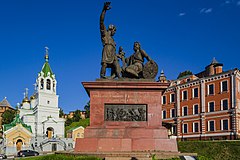| Unity Day | |
|---|---|
 | |
| Official name | Day of People's Unity |
| Observed by | Russia |
| Significance | The end of the Polish occupation of Moscow in November 1612, and more generally the end of the Time of Troubles and turning point of the Polish intervention in Russia |
| Celebrations | Flag hoisting, parades, fireworks, award ceremonies, singing patriotic songs and the national anthem, speeches by the President, entertainment and cultural programs |
| Date | 4 November |
| Next time | 4 November 2025 |
| Frequency | Annual |

Unity Day, also called the Day of People's Unity or National Unity Day (Russian: День народного единства, romanized: Denʹ narodnogo yedinstva), is a national holiday in Russia held on 4 November [O.S. 22 October]. It commemorates the popular uprising which ended the Polish occupation of Moscow in November 1612, and more generally the end of the Time of Troubles and turning point of the Polish intervention in Russia.
The day's name alludes to the idea that all classes of Russian society united to preserve Russian statehood when there was neither a tsar nor a patriarch to guide them. In 1613 tsar Mikhail Romanov instituted a holiday named Day of Moscow’s Liberation from Polish Invaders.[1] It was celebrated in the Russian Empire until 1917, when it was replaced with October Revolution Day, a commemoration of the Russian Revolution. Unity Day was reinstituted by the Russian Federation in 2005, when the events of the year 1612 have been celebrated instead of those of 1917 every 4 November since. The day is also the feast day of the Russian Orthodox icon of Our Lady of Kazan.
- ^ "Russia Newsroom article". Archived from the original on 2011-11-27. Retrieved 2012-11-04.